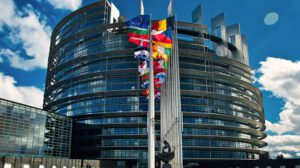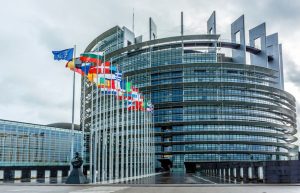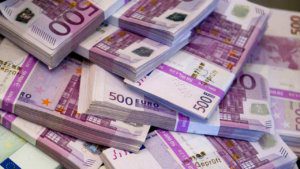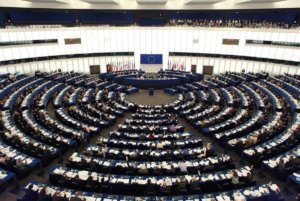
Members of the European Parliament’s Committee on Foreign Affairs and the Subcommittee on Security and Defense will travel to Ukraine from January 30 to February 2 to gather information on the current crisis.
As reported on the website of the European Parliament on Wednesday, a delegation of eight MEPs led by Foreign Affairs Committee Chair David McAllister (Germany) and Security and Defense Subcommittee Chair Nathalie Loizeau (France) will carry out a fact-finding mission to Ukraine on Sunday.
“During the visit… MEPs will observe the situation on the ground, and demonstrate the European Parliament’s solidarity with the Ukrainian people and its opposition to any steps by Russia to further escalate the crisis. The visit is part of large-scale diplomatic effort to de-escalate the situation and avoid the disastrous consequences of a possible war in Ukraine,” the European Parliament said.
The delegation of the European Parliament will meet with the Speaker of the Verkhovna Rada of Ukraine, and has requested meetings with the President, the Prime Minister, the Foreign Affairs and Defence Ministers and the deputy Prime Minister for European and Euro-Atlantic integration. They will also hold talks with the Secretary of Ukraine’s National Security and Defence Council and Members of the Verkhova Rada’s Committees on Foreign Affairs, on Ukraine’s Integration into the European Union, and on Security and Defence.
According to the statement, in the resolution adopted in December on Ukraine, the European Parliament expressed support for the independence, sovereignty and territorial integrity of Ukraine within its internationally recognized borders.

The European Parliament reaffirmed its continued support for the sovereignty and territorial integrity of Ukraine, continuing to condemn the illegal annexation of Crimea and the de facto occupation of certain regions in the east by Russia.
This is discussed in the section “Cooperation in the field of the common foreign and security policy (CFSP)” of the resolution on Ukraine’s implementation of the Association Agreement, voted by the European Parliament during the plenary session. The spokesperson was deputy from the European People’s Party Michael Gahler (Germany).
“The European Parliament Reiterates the Union’s unwavering support for and commitment to Ukraine’s independence, sovereignty and territorial integrity within its internationally recognised borders, and its support for the internationally coordinated sanctioning of the Russian Government and agents who are undermining the country’s sovereignty and territorial integrity,” according to the resolution.
In addition, the European Parliament ontinues to condemn the illegal annexation of Crimea and Sevastopol and the de facto occupation of certain areas of Donetsk and Luhansk and calls on the Russian Federation to fulfil its international obligations, to withdraw its military forces from the territory of Ukraine.
The European Parliament also welcomes the resumption of the peace talks under the Normandy four format on 9 December 2019 in Paris after a deadlock of three years.
The European Parliament strongly condemns Russia’s destabilising actions and military involvement in Ukraine; expresses concern about Russia’s ongoing build-up of military facilities and installations in the Crimean Peninsula. In addition, the European Parliament condemned Russia’s illegal actions aimed at seizing control of the Kerch Strait, as they constitute a breach of international maritime law and Russia’s international commitments, in particular the construction of the Kerch Bridge and its rail link without Ukraine’s consent, the laying of underwater cables and the closing up and militarisation of the Azov Sea, which severely hinders Ukraine’s economic activities. The European Parliament called on the Russian Federation to ensure unhindered and free passage to and from the Azov Sea in line with international law, and access to the occupied Ukrainian territories of Donbas and annexed Crimea for international non-governmental organizations and international humanitarian organisations and to release of all Ukrainian political prisoners and prisoners of war in Russia, Crimea and the parts of Donbas not controlled by the Ukrainian Government.
The European Parliament also considers it possible for the Commission and the European External Action Service to intensify their efforts towards a peaceful settlement of the conflict.
In addition, the European Parliament called on the EU High Representative, the Commission and the member states to provide the necessary support for the creation of the Crimean International Platform, which will coordinate, formalize and systematize efforts aimed at restoring the territorial integrity of Ukraine.

The European Parliament will vote on the proposal of the European Commission to provide Ukraine EUR 1.2 billion to combat the economic consequences of the coronavirus COVID-19 pandemic on May 13 on a request for an urgent procedure. The corresponding item is recorded on the agenda of the session, which will be held from May 13 to May 16.
The issue of macro-financial assistance to enlargement and neighbourhood partners in the context of the COVID-19 pandemic crisis was recorded first in the section on voting on a request for an urgent procedure.
Due to the restrictive measures taken in connection with the COVID-19 pandemic, the majority of EP deputies will vote remotely without discussion. The vote result is expected to be positive.
Ukraine is one of ten partner and neighboring countries that will receive a total of up to EUR 3 billion in aid. Moreover, Kyiv will be provided with the largest amount of funds. Thus, Albania will receive EUR 180 million, Bosnia and Herzegovina – EUR 250 million, Georgia – EUR 150 million, Jordan – EUR 200 million, Kosovo – EUR 100 million, Moldova – EUR 100 million, Montenegro – EUR 60 million, Northern Macedonia – EUR 160 million and Tunisia – EUR 600 million.
Earlier, on May 5, this proposal of the European Commission, which was adopted on April 22, was supported by the ambassadors of the member states of the European Union, thus giving a green light for the further procedure – voting in the European Parliament with subsequent final decision within the framework of the EU Council.
These funds will be provided within 12 months in the form of loans on “highly concessional terms to help these countries cover their urgent financing needs.”
The funds will be available for twelve months and will be paid in two installments. The maximum average loan maturity is 15 years.
Explaining the details of the allocation of money, Ukraine’s representative to the EU Mykola Tochytsky has said that the macro-financial assistance (MFA) of the European Commission to Ukraine in the amount of EUR 1.2 billion will be provided in two tranches: first EUR 600 million will be provided at once after the approval of the decision by the European Parliament and the Council of the European Union unconditionally, and the second tranche of EUR 600 million will be provided under conditions, the negotiations on which will take place soon.

President of the European Parliament David Sassoli has announced his readiness to visit Ukraine. He said this at a press conference in Brussels on Thursday. Speaking about the presentation of the Sakharov Prize to Ukrainian film director Oleh Sentsov, Sassoli said that at present Sentsov “has health problems.” “He has been invited to come to Brussels or Strasbourg to receive it. We will be extremely happy to see him if he is able to travel. Today, in the conference of presidents I said I am going to visit Ukraine myself,” the EP president said. Oleh Sentsov, together with 34 Ukrainians, arrived in Kyiv on September 7 as a result of the mutual release of detainees between Ukraine and Russia.

The European Parliament (EP) on June 13 voted in favor of the third Macro-Financial Assistance (MFA) programme for Ukraine foreseeing the provision of EUR 1 billion to Ukraine. European parliamentarians approved the package for Ukraine with 527 supportive votes, 124 votes against the provision of this assistance and 29 parliamentarians abstained from a vote.
“I am waiting for the final decision from the Council of the European Union (EU) in the near term,” Ukrainian President Petro Poroshenko wrote on his Facebook page. As reported, the Council of the EU preliminarily approved the provision of financial assistance for Ukraine in the amount of EUR 1 billion, which will be used by Ukraine within two years. The loans will support economic stabilisation and a programme of structural reforms.
The Council of the EU said that the further disbursements will be conditional on Ukraine respecting democratic mechanisms and the rule of law, and guaranteeing respect for human rights.
The conditions will be laid down in a memorandum of understanding between Ukraine and the Commission. The Commission will be responsible for disbursing the macro-economic assistance. The Commission and the European External Action Service will monitor the fulfilment of the conditions,” the Council said.
Parliament, Council and Commission agreed a joint statement in the light of unfulfilled conditions and the cancellation of the third instalment of the previous programme.
According to the joint statement, the economic policy and financial conditions of the Memorandum of Understanding to be agreed between the European Union and Ukraine shall include inter alia obligations to strengthen the governance, the administrative capacities and the institutional set-up in particular for the fight against corruption in Ukraine, notably regarding a verification system for asset declarations, the verification of companies’ beneficial ownership data and a well-functioning specialised anticorruption court in line with the recommendations of the Venice Commission. Conditions on combating money laundering and tax avoidance shall also be considered.
“If the conditions are not met, the Commission shall temporarily suspend or cancel the disbursement of the macro-financial assistance,” the Parliament, the Council and the Commission said in the joint statement. A pre-condition for granting the Union’s macro-financial assistance should be that Ukraine respects effective democratic mechanisms, including a multi-party parliamentary system.
According to the published materials, the loans shall have a maximum average maturity of 15 years. It will be divided into two disbursements, which sizes will be approved additionally. The Union’s macro-financial assistance shall be made available for a period of two and a half years, starting from the first day after the entry into force of the Memorandum of Understanding with Ukraine.
The Union’s macro-financial assistance shall be disbursed to the National Bank of Ukraine. Subject to the provisions to be agreed in the Memorandum of Understanding, including a confirmation of residual budgetary financing needs, the Union funds may be transferred to the Ukrainian Ministry of Finance as the final beneficiary.
The EU recalled that since May 2014 Ukraine has received EUR 2.81 billion of macro-financial assistance from the Union. Following its technical mission of November 2017, the IMF revised its estimates of Ukraine’s external financing needs, identifying an additional gap of $4.5 billion for 2018 and 2019.

The European Parliament will vote on the third macro-financial assistance program for Ukraine in the framework of the plenary session on June 13. The program envisages the allocation of EUR 1 billion. According to the information posted on the website of the European Parliament, a voting on a package of further macro-financial assistance for Ukraine is scheduled for Tuesday, June 12, and Wednesday, June 13. MEP Jaroslaw Walesa is to report on it.
As reported, the EU Council approved the allocation of financial assistance to Ukraine in the amount of EUR1 billion, which is expected to be used by the Ukrainian authorities within the next two years. The purpose of allocating funds is “economic stabilization and a program for structural reforms.”
This is the third package of financial assistance to the Ukrainian authorities from the EU since 2014. In 2014, the EU sent aid to Ukraine in the amount of EUR 1.6 billion, and in 2015 – EUR 1.8 billion.